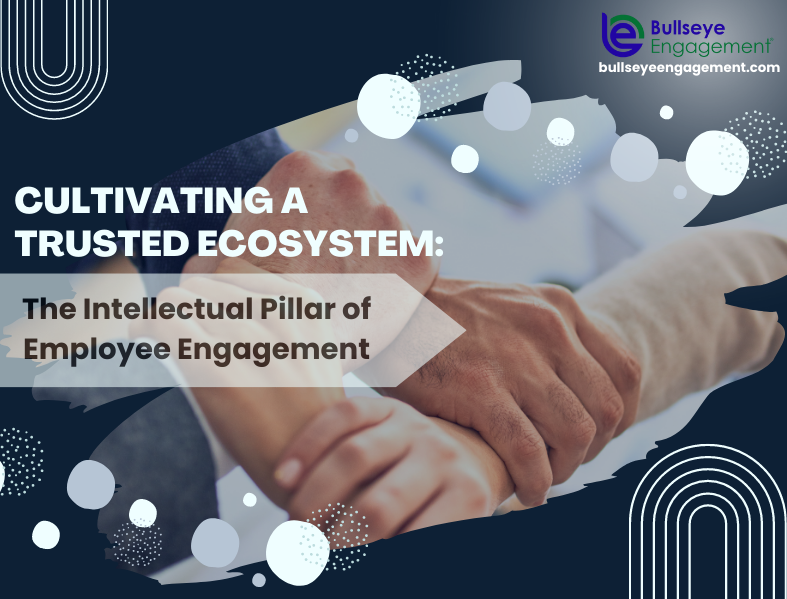Introduction
Cultivating a Trusted Ecosystem: The Intellectual Pillar of Employee Engagement
In the intricate tapestry of workplace dynamics, trust emerges as an intellectual pillar underpinning the fabric of employee engagement. The paramount importance of trust cannot be underestimated, for it acts as a catalytic force, invigorating the very essence of organizational prosperity. As we delve into the nuanced interplay of trust and engagement, we uncover the profound impact it wields on fostering innovation, propelling productivity, and nurturing a harmonious corporate culture. In this discourse, we shall traverse the intellectual terrain of building trust in the workplace, delving into the cognitive dimensions that govern this indispensable foundation of employee engagement.
The Intellectual Significance of Trust
Trust, in its intellectual manifestation, assumes the role of a cognitive mechanism, facilitating collaborative cognition and knowledge-sharing within an organizational ecosystem. Through the prism of trust, employees ascertain the reliability of their colleagues, superiors, and the organizational structure, as a whole, thereby fostering a conducive environment for intellectual exchange. This interplay engenders a virtuous cycle, wherein knowledge flourishes, and employees are galvanized to engage in endeavors that transcend the mundane.
The Nexus of Transparent Communication
Transparent communication serves as the linchpin of trust, engendering intellectual openness and dialogue. Within this domain, leaders assume the mantle of intellectual stewards, orchestrating symphonies of clarity and authenticity. Through candid discourse, employees garner insights into organizational vision, aspirations, and even vulnerabilities. This intellectual honesty not only instills confidence but also cultivates a culture of inquiry and idea-sharing, nurturing the roots of employee engagement.
The Empowerment Paradox
Empowerment, as an intellectual pursuit, emerges as a paradox that demands careful navigation. By endowing employees with autonomy and decision-making authority, organizations invoke the spirit of trust, communicating their belief in the intellectual acumen of their workforce. However, this empowerment requires a delicate balance, for it necessitates an intellectual interdependence where accountability aligns with autonomy. As organizations navigate this equilibrium, they cultivate a culture where intellectual expression is cherished, fostering a profound sense of engagement.
Intricacies of Appreciation and Recognition
Recognition, in its intellectual essence, surpasses the realm of superficial commendations. It is a testament to intellectual rigor, a celebration of creativity, and an affirmation of the intrinsic worth of employees’ contributions. Genuine appreciation is not merely a ritualistic gesture but a cognitive validation that fuels the intellectual fire of employees. By acknowledging their intellectual prowess, organizations reinforce trust, kindling a virtuous cycle of ever-evolving engagement.
Unraveling the Dimensions of Active Listening
In the symphony of trust, active listening forms the intellectual overture that paves the way for profound understanding and empathetic resonance. It is an intellectual endeavor that transcends the superficial realm of hearing, delving into the profound depths of cognitive comprehension. By truly absorbing and acknowledging the concerns, ideas, and aspirations of employees, organizations sow the seeds of trust, invigorating the intellectual underpinnings of engagement.
The Intellectual Legacy of Leadership
Leadership, as the custodian of intellectual guidance, plays an inimitable role in nurturing trust and, consequently, fostering engagement. Intellectual integrity and ethical comportment are the hallmarks of exemplary leaders, who serve as beacons of trust in turbulent seas. A profound commitment to transparency, intellectual empowerment, and genuine appreciation sets the tone for an intellectually vibrant workplace that propels engagement to soaring heights.
Cultivating Intellectual Synergy
The intellectual synergy that ensues from a trusted ecosystem impels employees to transcend individual ambitions, embracing collective cognition. In a milieu where trust thrives, silos crumble, and the intellectual effervescence of teams reaches its zenith. The power of collective intellectual prowess not only augments problem-solving capabilities but also stimulates innovation, elevating the organizational trajectory to unprecedented heights.
Conclusion
In the grand tapestry of employee engagement, trust emerges as an intellectual masterpiece, meticulously woven through transparent communication, intellectual empowerment, genuine appreciation, active listening, and visionary leadership. As organizations cultivate this trusted ecosystem, they unravel the intellectual dimensions that foster engagement and galvanize employees to transcend mere workplace conventions. Trust, as the luminous beacon guiding the intellectual aspirations of an organization, bestows upon employees the gift of meaningful contribution and a profound sense of purpose. Thus, by embracing trust as an intellectual imperative, organizations lay the foundation for an engaged and intellectually invigorated workforce, ready to scale the summits of excellence and redefine the contours of success.

















